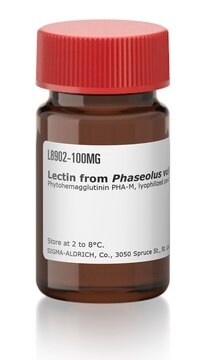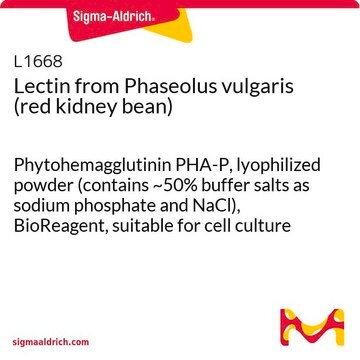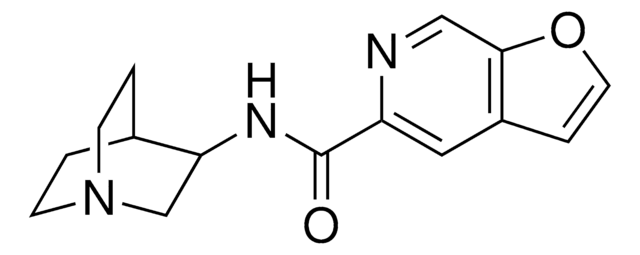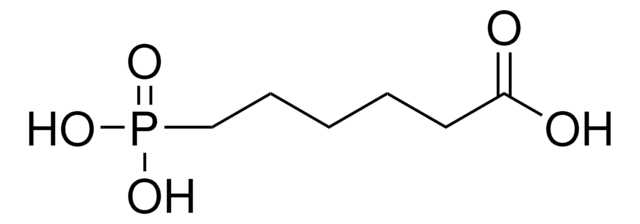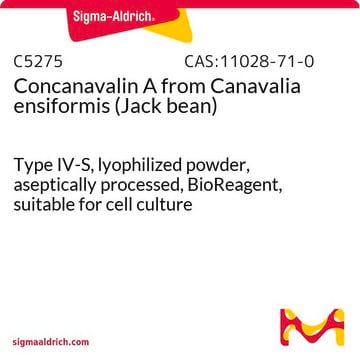11082132001
Roche
Phytohemagglutinin-M (PHA-M)
from Phaseolus vulgaris
Sinónimos:
PHA-M
Iniciar sesiónpara Ver la Fijación de precios por contrato y de la organización
About This Item
UNSPSC Code:
23201100
Productos recomendados
Quality Level
sterility
non-sterile; 0.2 μm filtered
form
lyophilized
packaging
pkg of 20 mg
manufacturer/tradename
Roche
application(s)
hematology
storage temp.
2-8°C
General description
Phytohemagglutinin (PHA), the lectin extract from the red kidney bean. PHA consists of five isolectins (L4E0, L3E1, L2E2, L1E3, L0E4) each being a tetramer held together by noncovalent forces. The subunits L (leukocyte reactive) have a high affinity for lymphocyte surface receptors, but little for those of erythrocytes, and are responsible for the mitogenic properties of the isolectins. E (erythrocyte reactive) is responsible for the erythrocyte-agglutinating properties.
Application
Phytohemagglutinin (PHA) is a potent mitogen used to stimulate cell proliferation in lymphocyte cultures.
Phytohemagglutinin-M (PHA-M) has been used in the activation of Jurkat and primary cells. It has also been used to treat polymorphonuclear blood cells(PMBCs)
Biochem/physiol Actions
Phytohemagglutinin (PHA) has mitogenic and potent cell agglutinating activities. It binds to T-cell membranes and stimulates cell division and metabolic activity. PHA has the ability to stimulate close contacts between cell membranes.
Specifications
Biological activity: <10 μg/ml for maximal stimulation of DNA synthesis (BrdU incorporation) with human peripheral blood lymphocytes.
Preparation Note
Working concentration: 2 - 10 μg/ml
Approximately 2 - 10 μg/ml for the stimulation of peripheral blood lymphocytes
Storage conditions (working solution): The reconstituted solution is stable for 2 weeks at 2 to 8 °C or for several months when stored in aliquots at -15 to -25 °C.
Approximately 2 - 10 μg/ml for the stimulation of peripheral blood lymphocytes
Storage conditions (working solution): The reconstituted solution is stable for 2 weeks at 2 to 8 °C or for several months when stored in aliquots at -15 to -25 °C.
Reconstitution
PHA-M should be reconstituted in sterile double-dist. water (final concentration: 2–10 mg/ml). Further dilution with medium or PBS (phosphate buffered saline).
Other Notes
For life science research only. Not for use in diagnostic procedures.
Storage Class
11 - Combustible Solids
wgk_germany
WGK 1
flash_point_f
does not flash
flash_point_c
does not flash
Certificados de análisis (COA)
Busque Certificados de análisis (COA) introduciendo el número de lote del producto. Los números de lote se encuentran en la etiqueta del producto después de las palabras «Lot» o «Batch»
¿Ya tiene este producto?
Encuentre la documentación para los productos que ha comprado recientemente en la Biblioteca de documentos.
Los clientes también vieron
Polyfunctional Melan-A-specific tumor-reactive CD8+ T cells elicited by dacarbazine treatment before peptide-vaccination depends on AKT activation sustained by ICOS
Ornella Franzese
Oncoimmunology, 5(5), e1114203-e1114203 (2016)
Gilles Darcis et al.
Cell reports, 30(7), 2284-2296 (2020-02-23)
The HIV latent reservoir forms the major hurdle to an HIV cure. The discovery of CD32 as marker of this reservoir has aroused much interest, but subsequent reports have challenged this finding. Here, we observe a positive correlation between the
Julia Kölle et al.
iScience, 25(6), 104440-104440 (2022-06-17)
The cytokine interleukin-3 (IL-3) acts on early hematopoietic precursor cells. In humans, Treg cells secrete IL-3 and repress inflammatory cells except for basophils. The present study aims to elucidate the contribution of IL-3 in the development and the course of
TRIM28 promotes HIV-1 latency by SUMOylating CDK9 and inhibiting P-TEFb
Ma X, et al.
eLife, 8, e42426-e42426 (2019)
Tania Del Rivero et al.
Frontiers in immunology, 13, 977809-977809 (2022-12-16)
Extracellular vesicles isolated from human amniotic fluid (AF-EVs) have previously been found to modulate inflammation and macrophage infiltration in a mouse model. However, the effects of acellular amniotic fluid (acAF) or AF-EVs on the T-Cell immune response have not been
Nuestro equipo de científicos tiene experiencia en todas las áreas de investigación: Ciencias de la vida, Ciencia de los materiales, Síntesis química, Cromatografía, Analítica y muchas otras.
Póngase en contacto con el Servicio técnico

